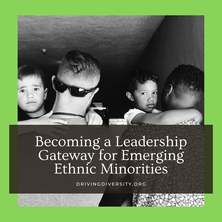 It’s 1:05pm and in the last 4 hours I’ve met with eight high impact missionaries on our Chi Alpha team here in Santa Cruz. Six of them happen to be ethnic minorities. Prior to that I had a staff huddle with two couples that are directors of campus ministries my wife and I planted nearly 20 years ago. Their marriages and ministries are thriving. All of them are ethnic minorities. Of the five Chi Alpha ministries we are focused on planting in the next three years on the West Coast, four directors happen to be ethnic minorities. Two of them happened to be women. It wasn’t until I sat down to write this blog a few minutes ago that I realized just how blessed we are to be a small part in the ever growing picture of empowering a heavenly reflection of His image bearers into leadership. We didn’t arrive here nor will we proceed into greater measures of kingdom reflection by focusing on recruiting tactics in ministry or leadership that are based on earthly ethnicity or culture. As always, if you ask me about kingdom fruit I will direct your attention to the kingdom focus by which it was produced. The driving convictions that have helped us move forward come from a few streams of divine thinking that I would like to unpack. 1. The most authentic expression of the gospel is delivered by the gifts of the Holy Spirit (1 Corinthians 2:4 & 14:24-25). When the focal point of finding pre-Christians is based on what we see and hear the Father doing and saying, we eliminate opportunity for personal comfort or bias to direct the steps of beautiful feet that bring the good news. This focus is tied to the next in that there is no one more relevant than the Holy Spirit. “Outreach” often gets reduced to a form of godliness that denies His power--opportunistic events that lie well within our ability with no need of His power. These events are noble, but often create risk-free environments for our students to show up and meet people within pre-measured settings. Limited to the attractional value our outreaches hold to individual ethnicities. The Lord modeled perfect missionary work in articulation of the gospel and demonstration of power. Not one without the other. The gifts of God reveal the goodness of God and make room for the hardest of Truth to be met with humility. This focus has broken the weakness of personal bias and comfort in reaching students on our campuses. It expands the gateway of bringing people to Christ according to the measure of Gods heart for all ethnicities. This is our foundation to becoming a leadership gateway for Ethnic minorities. 2. Kingdom culture is the perfected state of all culture (Revelation 7:9-10). We do not become culturally relevant by imitating our culture, we become culturally relevant by exemplifying everything our culture was designed to become. This doesn’t mean we ask students or staff to reject their cultural heritage, but our focus is on each person anchoring in their eternal identity in Christ so their culture will be displayed in power and purity, giving glory to God. The Apostle Paul said “I regard no man according to the flesh” (2 Corinthians 5:16). When we remove our focus from attempting to portray expertise, connect based on individual cultures and place it on an authentic display of kingdom culture (His kingdom come…on earth as it is in heaven), Christ is lifted up and all mankind is drawn to Him. This frees the heart of leaders and students to aim at pleasing God and re-presenting Him in love and power rather than the often inadequate attempts to connecting at a carnal level with the multiplicity of ethnicities represented on campus. We were all created to worship. If each believer's witness and connection is an expression of their worship to Him, it creates a gateway for all nationalities to discover, through experience, the God who made them in His image. In other words, a focus on bearing His image begets freedom to bear His image. So our personal culture becomes a being a follower within the perfect culture of His kingdom. 3. We are raising fathers and mothers, not kids (1 Thessalonians 1:6). This is a primary key in becoming a leadership gateway for emerging ethnic minorities. Isaiah 46:10 shows us that our Father’s focus starts with the end from the beginning. When people seek an end of great numerical growth they will always want more students. This is noble assuming the desire to increase attendance is for the sake of spiritual growth and maturity in every attendee. But when the foundational focus of our ministry becomes raising fathers and mothers in the faith we enter into the trans-generational element of spiritual leadership. Similarly we celebrate the desire of any parents that want to have kids. But when that desire is rooted and articulated in the focus of raising great fathers and mothers, it actually shifts the words and actions of how people parent. Remember, semantics are seeds. Our words are the seeds that will form the eternal fruit of our leadership in prayer and instruction. When we form the future by faith just like our Father, in the end from the beginning, our ultimate focus does not become distracted by our immediate options. Our aim to disciple responsible and reproducing men and women of God materializes in the way we raise up and release leaders of all ethnicities into the roles God designed them for. In contrast, when our ministry goal doesn’t exceed “getting more staff on our team” or “getting more students in the door” the impotence of our dreams often only yields our self-sufficient ability to get people like ourselves around us. A focus on raising fathers and mothers of all those entrusted to us will require our hearts to prepare every individual for leadership within our Fathers house without selectively limiting others to our personal comforts or bias. 4. When you get cut my blood falls to the ground (Acts 17:26). We are called to “Reconcile students to Christ…” because this is the only foundation by which mankind can find all authentic reconciliation. There are an unending array of fractions and injustices with varying histories and complexities. But Acts 17:26 says, “And He has made from one blood every nation of men to dwell on all the face of the earth, and has determined their pre-appointed times and the boundaries of their dwellings, so that they should seek the Lord…” (Italicize added). We have all scattered only to be gathered again under one Lord. The reconciliation of all people can't be accomplished in earthly terms--since the beginning of time mankind has found a way to be divided. But the reconciliation of all people CAN be accomplished in the eternal reality of our identities where our bloodlines are reconnected in Christ. Real brotherhood is found in the place where our earthly ethnicities submit to our heavenly identity. I can mourn and rejoice in harmony with anyone who is part of the same Body as me, the Body of Christ. Let me say this frankly. If you want to be a leadership gateway for emerging ethnic minorities, it begins with a commitment to Spirit-led evangelism. The same Spirit that led Jesus to prophecy over a Samaritan woman, Paul to perform works of power amongst the Gentiles, and Peter to become the Apostle to the Jews will lead every staff and student into kingdom diversity that could not be manufactured by any measure of tactical focus on ethnicity. When we keep our focus on the ultimate, our prayers and plans will flush out to reflect and produce that which our heart bleeds for. It isn’t that Jesus won’t give us tactics, it is that His tactics are much simpler than ours. Abiding in connection and grafting all ethnic branches to His vine is a product of authentic witness and practice that flows from a real relationship with God and others. This may seem too simple and and risky. The only risk is that we have less perceived control over the outcome. But our control is only an illusion. If you are exhausted from attempts at making your ministry look like heaven on earth, I challenge you to begin with these four focuses. This is not a comprehensive blog, but I know the fruit we are bearing today can not be attributed to any measure of tactical effort. I pray God will grace you in fulfilling all that is in your heart for reaching and raising up all ethnicities He has surrounded you with. If I can ever be of service to you or your team please don’t hesitate to reach out. Jeremy Anderson jeremy@wcxa.com 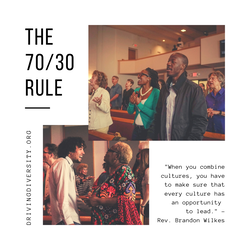 It was around 2007 when when we, Peoples Church Cincinnati, were taking the whole congregation through a 20 week long experience called the “Vision Experience”. It was a small group study that we put together internally to help the congregation grow in racial unity and diverse relationships by having difficult conversations about race in a Christian context. Part of the curriculum included historical information, personal stories, and experiential exercises. During the course of the 20 weeks the leadership committee would evaluate how the groups were performing by getting feedback from the facilitators, the church staff, and our own experiences. At one of these debriefs, I remember discussing a subject that had come up in several of the small groups: people of different cultures and different church backgrounds were not enjoying certain aspects of the church service. At this point in time the church was still very much in transition from being a 98% homogeneous White church to one that was now 15-20% people of color including 1st generation immigrants. Chris Beard, our lead pastor, was pressing forward with a vision of being a Rev. 5:9 church like Heaven: many ethnic groups and languages all worshiping Jesus together. Bringing this vision to fruition was slowly introducing different cultural influences into the church services. Varied preaching styles, an updated look of the facility, and multi-cultural worship music were some of the gradual and radical adjustments that were made. The result was that people who loved Jesus, loved the vision of the church, and wanted to be a part of what God was doing still had difficulty with some aspects of the church. It was during this time that the leadership team came up with the 70/30 Rule to help everyone embrace and celebrate what God was doing in Peoples Church. The 70/30 Rule says that everyone in the church should expect to fully enjoy 70% of what happens at the church while expecting to not feel immediately drawn to or understand the other 30% because that portion is for someone else’s full enjoyment. Furthermore, when something is happening in church that is not of your preference you should celebrate that because that means someone else is feeling connected to Christ and His church in that moment. To help drive this point home, I would say as a service began, “Make sure you young people here today don’t sit down when the worship team goes into that old school hymn! Make sure you stay standing just the same, even though that is not your type of music. Because that song isn’t for you. That song is for the senior saints that are being brought back to the day they fell in love with Christ during that song. So we want you young folks to celebrate with them the same way they celebrate when your repetitive Bethel worship song is played.” Many people can relate to not enjoying certain types of worship music, but when it comes to several cultures coming together people will have cultural clashes in so many situations. Food selection at gatherings, dress code at events, start time for celebrations, length of service, outcomes for meetings, and so many other things are effected by cultural norms. Every culture has their standard for these types of things, but when you combine cultures you have to make sure that every culture has an opportunity to lead. This means that someone is always going to feel out of place and we want that feeling to be celebrated. In effect, the 70/30 Rule is the basis for creating a new culture in an intentionally diverse ministry. The new culture is celebrating being uncomfortable so that others will have comfort. There is no scientific study or mathematic rigor behind the 70/30 percentages, we just went on gut feel when we named it. But over the past 13 years we have found that people embrace it and when they see the beauty of God’s diversely united church they understand the value.  We sat silently at a downtown coffee shop, swirling the Rwandan brew in our cups, the Cincinnati skyscape towering over our sidewalk table — two Ohio Assemblies of God pastors sharing hearts and vision. He asked, “How would you counsel me to lead my (midsize, suburban) congregation into a multiethnic future? I feel a profound burden to do this. We can’t stay where we are. Our city needs this. Our church needs this. But I don’t know what I don’t know.” This wasn’t the first time I’ve heard this. It seems God is burdening many hearts these days for church reflecting heaven on earth. Our own story as Peoples Church Cincinnati involves a 20-year transition from a 98 percent homogeneous white commuter church to a 50 percent nonwhite congregation comprising 30-plus nations. And despite the racially charged times in which we live, we are 25 percent African-American. The Lord has done this. As I contemplated my friend’s earnest question, I felt stirred to reply, “Start with theology. Whatever you do, root it in Scripture. Hell will fight you on this, and when it does, you want this vision anchored in God’s Word.” I shared from Ephesians 2 and 3 about a biblical model of a multiethnic church. The intensity of God’s mind on this matter captivates my heart and astounds me. The Ephesian Model New Testament Ephesus compares to today’s American society. With a mix of Gentile God-fearers, conservative zealots, marketplace liberals, idol worshipers, indigenous people, and internationals, the city was ethnically, economically, religiously diverse. This port population center on the western edge of what is now Turkey flourished as a cosmopolitan melting pot, the Roman Empire’s third most influential city. The Ephesian church was also a collective — united in Christ, Spirit-filled and gospel-rooted. This diverse congregation was making known the “manifold wisdom of God” — in the city and “in the heavenly realms” (Ephesians 3:10). Did you catch that? Not only was the church influencing society and spreading the gospel, but its Christ-centered existence in diverse unity was capturing attention in the spiritual realm. Paul calls this diverse unity of formerly disparate and hostile Jews, Greeks and Romans the “mystery of Christ,” which the Holy Spirit revealed (Ephesians 3:4-6). As this church came together, the mystery of Christ, hidden for ages, became apparent. Let that sink in. Our fractious United States could benefit from the same prophetic, reconciling Kingdom congregations. Such a movement would shake the gates of hell. In Ephesians 2, Paul provides a compelling vision and model for diversely united churches in our day. After unpacking the gospel, he links it to the idea of a diversely united local church. This message is applicable to your church setting — whether rural, suburban or urban. Continue reading here (Used with permission) 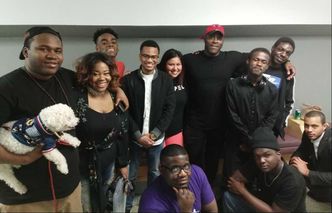 I. hate. waiting. I check Google to find the quickest way to work. I upgraded to the faster internet connection. My Volkswagen is turbo-charged. I want to get there, get it done, make it quick. In some ways, this mind-set has been helpful. It’s made me more productive, efficient, but in other ways, including planting ministry at Virginia Union University, it’s a character flaw. Planting is by nature a slow process. Patience is required to allow a seed that’s placed in prepared soil to take root and grow. This is the stage our campus ministry is in at Virginia Union. We’re planting. After we chartered as an official Chi Alpha chapter last year, I quickly forgot that fact. I thought we were off and running. Guys were connecting in greater numbers in our student-led small group and a women’s small group was primed to start. Students were being led to Jesus and being baptized every semester. Outreaches on campus were making waves—it was happening and happening fast! Chi Alpha @ Virginia Union was going to be huge in a hurry. But that’s not the typical planting process and it wasn’t the case for us either. Soon we were faced with a student leader needing to step down. We saw those new Jesus followers transferring or just not returning to campus and some of our most promising potential leaders were being pulled away to other opportunities. We were frustrated, disappointed, and even at times infuriated. All of those emotions were valid, but shouldn’t have been unexpected. As we stepped back and recognized where we were as a ministry there was a realization. We needed to take the good with the bad and allow the seed of this new ministry take root. This is planting. We went back to work, building relationships and trust on campus. We submitted to the process of becoming an official student organization. Just finding a faculty advisor took over 6 months! Not quick, but all part of the planting process and we’re beginning to see the roots taking hold. Chi Alpha is now an official student organization. Our staff workers Marcus Floyd and Jasmine Yanez were invited to take an upfront role in a Union chapel service highlighting student organizations. Students are beginning to adjust their schedules to prioritize the Chi Alpha community and that community is continuing to grow. Jasmine and Marcus were recently invited to an Easter dinner hosted by the VUU International Student Association. In the middle of the event the ISA director Ms. Michele Brown, addressed them both and said, “you are a part of our family.” Chi Alpha at Union isn’t huge. Our grow curve isn’t on a record pace, but we’re more rooted than ever. And as those roots go deeper into the soil of Virginia Union we believe our impact on the campus will be more significant and sustainable. It’s a slow process, but it’s worth it.  This week our Chi Alpha visited Riverside church in Atlanta. Big shout out to Pastor Dale Stephens and Pastor Tim McNeeley and that crew. God is doing a good work through that ministry down there. During a morning devotional, we learned about the value we put on things. Pastor Dale asked us the question, “How can you help raise someone's value so that their identity will rise in value as well? In our fight for kingdom diversity, we must be willing to put value on kingdom diversity. As we take a look at our leadership and our campus groups, does it reflect kingdom diversity? If it does not, what is it we must do to help our groups become more like the Kingdom of God? When we put value on Kingdom diversity, we will do whatever it takes. No matter the cost, no matter the comfort lost, we will make it happen. The questions we must ask ourselves to do this is:
As we do this, we will be fulfilling the Law of Christ; Love your neighbor as yourself. Let us set the standard of valuing every nation, tribe and tongue on our campus. SELAH 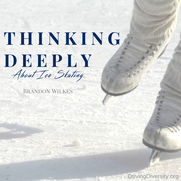 Last night I sat next to my daughter watching the figure skating competition for the Winter Olympics. We are not big figure skating fans, but she likes watching the competition, and I like making her feel nervous for the skaters as I shout “oh no don’t fall...” or “he’s going to drop her!” Not sure what that says about our relationship or me as a person, but it is so much fun. We also like to try to critique their outfits and guess their country. Most of the time, when guessing their country we are totally wrong because they are not usually wearing ethnic clothing and mostly all Europeans look....well, European. However, there was one skating pair that we both guessed correct without hesitation. It was a couple in which the man was white and the woman was black. We both at the same time shouted “France” and laughed. Why is it that we can see a black and white figure skating couple and know that they must be French and are sure that they are not American. America is the most diverse country in the world, but the thought that a black and white mixed race couple would be representing us in the Olympics was never a thought for a 43-year-old black man and his 13-year-old daughter. What is it about France that makes us think of it as a place where a mixed race couple on an ice skating team is normal? And why is it that a mixed race skating couple from France is normal? Not one commentator mentioned their race. If it had been an American couple we surely would have heard, “This is the first black woman to skate in a mixed pair Olympic competition.” In the early 20th century, France was a safe haven for many black people seeking equality. W.E.B. DuBois, Josephine Baker, and James Baldwin are a few famous African Americans who moved there, but there were also thousands of African American soldiers who moved there after WWII. They bought property, fell in love with French women, started businesses, and lived a normal life. Could it be that there is a subconscious thought that real equality and opportunity for black people is something only to be found in France? I remember seeing Debi Thomas skate in the Olympics as a teenager, so I know America has had at least one African American ice skater in the Olympics. So I am not sure what the answer is, but the question intrigues me. Why do both my daughter and myself have a positive view of France in this situation and not America? Do I have similar subconscious thoughts about America and race with things other than sports? Do others think the same way or the exact opposite? So what’s my point? I don’t know that I have one. I guess I hope that whoever is reading this blog would take the time to think about why they think the way they do about race in America. That you would wonder if some of your actions and reactions are in response to subconscious ideas that have uncertain origins, but real outcomes. Does that affect your church or ministry? Does it affect your personal relationships or your reactions to strangers? Is it possible for you to pass those ideas on to people you lead or even your children? Something to think about. 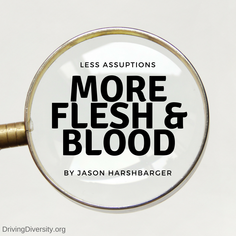 "How do you expect me to be a man when I have never had a f^&@ing man in my life?!" These words pounded my heart like a heavy weight descending through a bucket of water. I heard these words in a group of African-American young men I gathered with on Monday afternoons. This group, called B.O.S.S. (Brotherhood of Successful Scholars), had graciously taken me in and allowed this 30-something white guy from the cornfields of Indiana to be a part of their fellowship five years prior. On this particular night, we were exploring what it means to be a man and to hold your head high. The thoughts that flowed in discussion ranged from making money to showing the world that you should be respected to keeping your options open in your love life. The discussion began to pick up when someone interjected, "real men need to live with integrity." One of the young men in our group, who through his self-confession was attempting to leave behind a period of dealing drugs on campus, was troubled by this statement. He grew up in a home where there was no father, no husband and no male image-bearer of Christ. All he had known was his mom and grandmother. All he had known of being a man was to man up and make your way through; keep living and surviving, do what you need to do to stay alive. Now, he is being told to be a man with integrity. What exactly is that? This discussion got me to thinking: I believe we assume to much. We assume that if we tell people to do something that they will already know what that something is. We assume people have a mutual baseline of common sense (thus revealing our naivete). We even assume that varying people groups in this nation will all see things from the same point of view (yikes!). In this case, this young man got me to thinking about my assumptions. Do I assume young men know what it will look like to be a man? Do I assume that even from one people group to another there will be common streams of thought and standards for manhood? I make too many assumptions... However, here is where the good news comes in: just like Paul told the Colossians (1:24b) "...in my flesh I do my share on behalf of His body (which is the church) in filling up what is lacking in Christ's afflictions." (NASB), I also had the same opportunity. We have the same opportunity. What the believers in Colossae lacked was not hearing what Jesus had done for them, or believing what Jesus had done for them. No, what they lacked was flesh and blood; seeing what Jesus had done for them. Thus, through Paul's suffering for proclaiming Jesus' Name, these believers were able to see and experience in flesh and blood what that looked like. Similarly, young students (esp. young men) on our campuses throughout the country have heard about men...fathers, husbands, men of integrity...but until they see these men they may not truly believe they exist. Until they can experience them in flesh and blood, there will be something pivotal missing in their lives, freeing them to change the trajectory of their lives to in fact become these men of integrity. Until they can rub elbows with, ask questions to and do life with these men, they will not be able to become one of them. Here is where we come in: we can do this. What I realized was that my ministry amongst this group of African-American young men was me. I needed to live out what a quality husband looked like, what a father who cared about his children was, and what a man of integrity looked like in flesh and blood. I need not focus on being super relatable or even pretend to understand all that they go through as a minority. Just love them where they were for whom they were, and then show out what a man of God looks like. No performance needed, only truth, integrity and care. Already we have seen some young men's lives dramatically changed by the Gospel because of this. We can do this. Can we take some time to look about us and see what assumptions we have that we may need to reconsider? Can we take a few moments to consider who has lack around us (like the Colossians) that we may be able to fill up with our flesh and blood? If so, the Spirit will make you aware of opportunities around you that need Gospel, that need flesh and blood. May you become good news to those lacking around you. 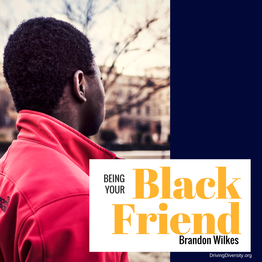 I was recently watching a television show where the host, a white woman, was discussing the topic of Black Lives Matter with a guest. The host was a proponent for the Black Lives Matter movement, and I was happy to see her using her platform to help other people understand more about racial inequality. At one point in the show, the host was encouraging other white people to gain more understanding about the topic through books and relationships with black people. In the middle of her encouragement she self corrected herself and said something like “but you shouldn’t go looking for black friends just to learn about what it’s like to be black, nor should you expect your black friends to be responsible for teaching you about their black experiences.” While I understood that she was trying not to put a greater burden on black people to be responsible for white people's ignorance, I disagree with the idea that black people or any other minority should shy away from sharing their life experiences with white people to intentionally educate them. As a black man I definitely understand that minorities don’t want to be brought into relationships to be someone’s token friend. I, like everyone else, want to be valued in life and especially friendships, for who I am, not what I look like. However, I know and other people of color should recognize, that who we are has largely been connected with what we look like. A great deal of our experiences in life have been influenced by our race. Where we live, our family dynamics, the food we eat, our struggles, accomplishments, and even the way we speak is connected in one way or another to our race. So the desire to be valued for who we are is inseparable from our looks; I am who I am because I am black. As a result, I have no issue with a white person wanting to be my friend because they desire to learn about my life as a black man. In fact, I don’t think it would be much of a friendship if they didn’t want to know about me. I teach a class about racial reconciliation in the church. The class is based on a book called Multiethnic Conversations by Oneya Okuwobi and Mark Demaz. As part of the class I encourage people to intentionally make friends with people who are different from themselves. While the encouragement is for the whole group, the people who are usually most in need of diverse relationships are the white people in the class. Because of the United States’ history of racism and by virtue of being the majority, white people have the opportunity to live in an almost exclusively white environment for the majority of their lives. Without making any effort, they may never have a need for non-white relationships. As a result, they often live segregated lives without really even knowing it. Minorities on the other hand must develop relationships with white people in order to navigate through the U.S. Minorities also tend to seek each other out when in majority white environments and therefore develop more cross racial relationships. Because of these realities, white people often have to be very intentional about making cross racial friendships while minorities do not. If they are not intentional they will never learn about the life experiences of other races. And if non-white people are not willing to befriend white people who have a desire to learn, then ignorance persists and no progress is made. Yes, they can read a book and learn some history, but we all know that a personal story is more impactful than a history lesson. I believe that this is extremely important for those of us in the church. We stand on a foundation that is more significant than our race or our personal preferences. If white people are not intentional about seeking cross racial friendships and minorities are not open to being that friend, then the church will remain segregated and our witness will continue to wreak of hypocrisy. For the cause of the gospel, white people need to take on the primary responsibility of intentionally seeking these relationships. They must do so recognizing that they will be uncomfortable and are possibly subjecting themselves to rejection. I believe their faith can stand up to someone not wanting to be their black friend. And for the same gospel, minorities should be willing to accept these sincere friendship requests. Perhaps Christ will be glorified, and a real friendship will result from the awkward one that began as you being their black friend. 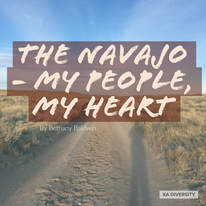 “So Bethany, where are you from?” “I grew up on the Navajo Reservation.” Usually the response I get to this is either one of amazement and curiosity or a blank stare and a polite “Oh, that’s nice,” because people have no idea what I’m talking about. Well I grew up on the Navajo Reservation, a very remote corner of the world in the great state of Arizona. I am half Navajo and half European descent. I was raised by my grandma, a non-native from Pennsylvania, teaching me the ways of the Bible. Also by my grandpa, a full Navajo, who still attends the native religious ceremonies, although it is more cultural than spiritual for him. The spiritual gauge is very unique out there, as well as my testimony and vantage point. My journey started with my grandma reading the King James Bible to me every weekend. With the combination of living in a rural place and my grandma dissatisfied with all churches, I never attended church. I spent my childhood week after week, sitting at the kitchen table, incredibly bored. With a focus heavily on the Old Testament, I was uninterested, and couldn’t understand anything but legalism. I lived my life trying to appease God through doing what was “right” and trying to avoid what was “wrong”. Even during these years, it’s amazing how God was patiently waiting for me to eventually come back and know Him for who He actually is. Through a failed relationship and a broken heart my freshmen year of college, it lead me to truly seek God, initially for healing. I was at an all time low and through Chi Alpha I was able to start a relationship with my Savior. No more sitting bored, or confused--I clung onto God with everything I had. Nothing has ever been the same since. Yes, he healed me, and He has become so much more. He has become my everything. I continue to grow in Him, in love and understanding of what I was never taught--the amazing grace of Jesus Christ. As I’ve matured and gotten stronger in my faith, I have been able to return home and see my land through the lens of Jesus. My heart searched the reservation and its spiritual climate only to find brokenness. The Navajo Reservation has suffered a great deal from alcohol, drugs, and abuse. If I could sum it up in one word, it would be “hopelessness”. People live hard lives with no relief. Also, I see religion coming in. There are 3 major religions--Native religion, Mormonism, and Catholicism. There isn’t enough time to talk about how religion has jaded the native people, but I do want to share my grandpa’s experience. My grandpa was sent to a Catholic boarding school, where he shares stories with a resentful tone. They forced him to cut his hair (long hair is traditional for Navajo men), and how they would make them wash out their mouths with soap if they heard the students speaking Navajo instead of English. The time we talked about God, something that stuck out was how he never thought it made sense that he had to talk to the priest who would then talk to God on his behalf. It was then that I was able to make a clear gospel presentation of the truth. The Mormon Church has been very successful in appealing to the Navajo people. They claim in the Book of Mormon that the Native Americans were the first people Jesus preached to upon his arrival to the Americas after his resurrection - this false gospel has won over many. They also understand what is important to a Navajo person--land. They have created a gardening project across the Reservation to help cultivate self-sustainability. The Reservation doesn’t need any more religion, it needs relationship. It needs real followers of Jesus to proclaim the truth. It needs those who will also respect that which is important to the people- land and family. We are not here to change culture, but to bring people into the Kingdom of God. It is not going to look like your church. What a beautiful image of Heaven if we are able to preserve the cultures and customs (without compromising any of God’s commandments) all over the world. My land is so beautiful and it breaks my heart that so few give Jesus credit for the natural beauty we live in. God made and loves the Navajo Nation--so I leave you with this, who will proclaim the hope and truth we have to this hopeless and lost people? 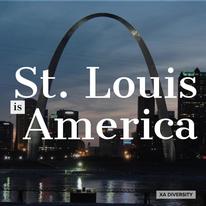 You have probably heard about the protests and the ongoing unrest that has erupted yet again in St. Louis. If you have not, then it is likely because you have, like many, grown so frustrated with racial issues in the U.S. that you have decided to drown it out or ignore it. Living here in St. Louis makes it hard to ignore, and more importantly, ignoring it is actually the problem. When I moved to St. Louis from Cincinnati, Ohio I heard that there was a significant racial divide here based on statics and the racial demographics of the city. There is a street called Delmar that almost divides the city in half, North and South. This street has acted as a proverbial railroad track for the city, as 95% of the African American population of the city lives north of these “railroad tracks”. I know, it almost seems impossible, but once you live here you not only come to recognize it as being true, you can also visually see the historic effect of this “railroad track” divide. South of Delmar, the city has continued to develop with businesses and new construction happening. You see early 20th century million dollar brick homes surrounding the historic Forest Park along with the History Museum, Science Center, Washington University and St. Louis Zoo. It is the place to live and be when you want to engage with what's new and great about the city. However, literally two city blocks north of this icon of wealth is the polar opposite. There is vacant lot after vacant lot and burnt out and abandoned homes. You can see the same large 20th century brick homes that decorate the neighborhood south of Delmar, only these homes are boarded up, abandoned and in disrepair. It is almost as though 75 years ago someone drew a line down Delmar Blvd and said all development money will go south of this line and nothing will happen north. The wealth, which at the time was 100% connected to race, will move south and leave the poor, which all but a few African Americans were at the time, will stay to the north. And so it has been done! When I arrived, I found it hard to believe that no one, Black or White was talking about this blatant racial disparity. Is it as though the battle was fought, and people had decided it was better to ignore rather than deal with this issue. Which brings us to the protests that continue to happen in St. Louis today. The shooting of Mike Brown and the acquittal of Jason Shockley has forced Black people in St. Louis out of silence. The unspoken agreement that was held before these events has been broken and now the protests are the icebreaker to the conversation that has to happen. And the protests and civil disruption will continue to happen until the conversations begin. I think St. Louis is a microcosm of America. In almost every city there is a Delmar divide that has been created by historical inequality. And for a while everyone agreed to not talk about it because some progress had been made. But with the 2016 election of Donald Trump and his openly racist remarks and immoral behavior, the unspoken agreement has been broken and now the protests are breaking the ice for the upcoming conversations that need to happen. Just as NFL players protest during the national anthem or university students refuse to have people speak at their graduation, the protests will continue until the conversations begin. So let’s talk! |
Categories
All
Contributing Authors
|

 RSS Feed
RSS Feed